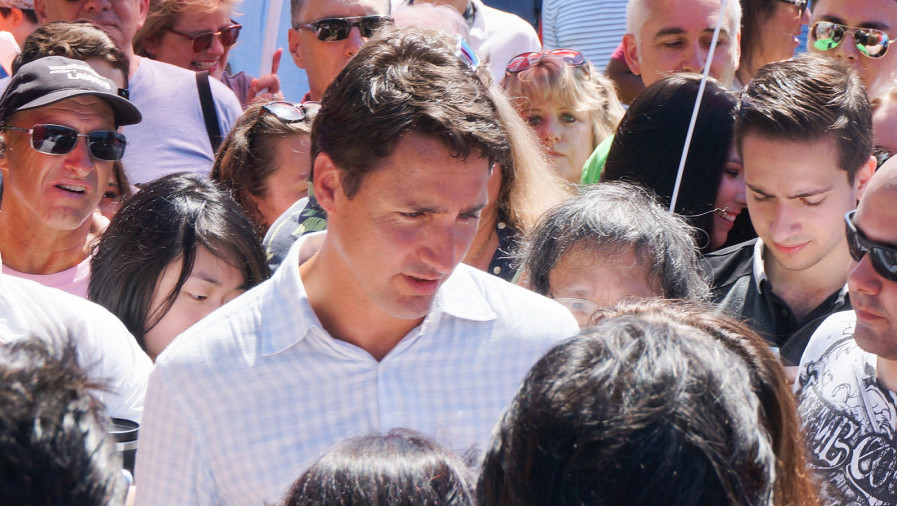Editor’s Note October 3, 2016: Did you hear the news? Canadian Prime Minister Justin Trudeau announced today that every Canadian province will have until 2018 to adopt a carbon pricing plan. To celebrate this key step forward in climate action, we are reviving this piece from earlier this year on Canadian perceptions of climate change. Now let’s hope that the United States can learn from Canada’s climate success and move forward on climate policy.
Prime Minister Justin Trudeau took provinces by surprise Monday by announcing they have until 2018 to adopt a carbon pricing scheme, or the federal government will step in and impose a price for them.
Majorities in every Canadian electoral district support emissions trading.
When it comes to climate change, Justin Trudeau, Canada’s new prime minister, seems to want a clean break from his Conservative predecessor, Stephen Harper. (As the Guardian reports, Harper has been accused of “muzzling government scientists and backtracking on climate promises.”)
Canada’s new Liberal government is talking of plans to price and cap carbon emissions. Provincial elections in 2015, including a new left-leaning government in Alberta which has already announced a carbon tax plan, may also boost the chances for Canadian climate solutions.
This month, Trudeau’s government held a National Climate Meeting in Vancouver with First Ministers and Indigenous leaders to develop a national climate policy framework for Canada. And just this week, four months after Trudeau’s election and eleven months before a new US president takes office, Trudeau and Barack Obama committed to work together on climate protections. They are expected to announce a series of common measures including a 45 percent cut in methane emissions from the oil and gas industry—a greenhouse gas that is roughly 80 times more potent than carbon dioxide—and protections for the Arctic (where scientists are now tracking the mildest winter ever recorded.)
With this window cracked open to North American cooperation and Canadian action, where do Canadians stand on climate issues?
Right on cue, the Yale Project on Climate Change Communications has mapped how Canadian perceptions of climate change, as well as support for carbon taxes and cap and trade, are distributed across the country, including projections by province and federal electoral district (or riding). (See also: Yale’s meta-analysis and interactive mapping of US climate opinions at the state, Congressional district, and county level.)
Here are some highlights:
- At the national level, 79 percent of Canadian voters acknowledge climate change is happening. (Compare that to 63 percent of US voters.) Quebec has the highest proportion of adults (85 percent) who say it’s happening, but even in Alberta, where belief is lowest, 67 percent understand climate change is happening.
- Local variation in Canada is significant. In Nova Scotia, for example, 87 percent say it’s happening, while only 66 percent in Saskatchewan agree; 56 percent say climate change is happening in the Souris-Moose Mountain riding in Saskatchewan compared to 91 percent in the riding of Halifax, Nova Scotia.
- Belief that the problem is real is lower in rural Canada, particularly across the Prairies. As the researchers point out, “The strongest levels of climate change belief exist in coastal BC, Quebec, Nova Scotia, and in urban areas across the country.” At the extreme, belief in climate change exceeds 90 percent of the public in the Quebec district of Laurier-Sainte-Marie, the district of Vancouver East, and the district of Halifax. That’s high! Yale mapping in the US tops out around 80 percent.
- Overall, belief in climate change is higher in Canada than in the US (as measured by Yale’s estimates for 2014). The low end of variation in Canadian beliefs map onto the middle of US variation.
- However, nationally, only 44 percent of Canadians think the cause is mostly human activities. US voters squeak ahead on this one, at 48 percent. It is in the six largest urban areas of Canada where people are most likely to see humans as the main cause. Notably, in Canada, belief that climate change is human-caused is lowest in the more greenhouse gas intensive parts of the country. “In other words, places that are more significantly contributing to climate change show lower beliefs that humans are the cause.” However, urban districts in Alberta show public opinion on this question closer to that of Ontario, Quebec, or BC.
- Despite these variations in core beliefs about the issue, there is widespread public support for climate policies. Majorities of the public in every federal electoral district (riding) support an emissions trading scheme. Support for emissions trading is highest in Quebec—71 percent—where a cap and trade system was implemented in 2013.
- Support for carbon taxes is more geographically differentiated, at 49 percent nationally (with opposition at 44 percent), but ranging from a low of 35 percent in the Northern Alberta riding of Fort-McMurray-Cold Lake to a high of 70 percent in the Montreal-area riding of Outremont. Support for carbon taxes is concentrated in urban Canada and British Columbia (where there is a carbon tax shift in effect).
- Support for carbon pricing policies is higher in provinces that have already implemented these policies. In other words, there is no evidence of a popular backlash against carbon pricing in places where people are experiencing them.
Canadians have lots of progress yet to make on attitudes and policy. But with the election of Justin Trudeau and like-minded leaders across Canada, the world’s climate may get a breath of fresh air.


Comments are closed.